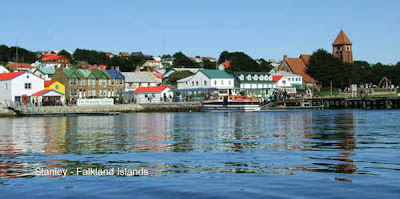
Yesterday, in a wreath laying ceremony, the Falkland Islanders remembered the day 30 years ago when the forces of Argentina surrendered to the British forces and the islands were returned to the British. The wreath laying ceremony involved some of the veterans who fought on the islands all those years ago. Yesterday's weather was typical Falklands — cold and windy with wet snow coming down horizontally. Not many people live on this group of very isolated, wind-swept islands in the South Atlantic. Argentina has been claiming rights to Los Malvinas for donkey's years and they provide an easy diversion for governments in Buenos Aries when things are not going right — which seems to be most of the time. The islanders have stated over and over again that they wish to remain British and we should defend their right to their self-determination without flinching. The islanders have now announced their intention of holding a referendum to ask the inhabitants what they want — presumably the question will be the simple one "Do you wish to remain British? Yes or No!" Yesterday the President of Argentina, Cristina Fernandez de Kirchner, went to the United Nations to demand that Britain negotiate with her country about sovereignty over the islands. This piece of theatre was backed by advertising in British newspapers in which they repeated their claims about the Falklands on the grounds of decolonization. An anachronism, she said.
The islands may have been visited by Patagonian Indians many years ago — perhaps over 500 — but evidence suggests that the islands were first discovered and marked on maps by the Portuguese in the 16th century. In 1592, John Davis an English explorer arrived there when his battered ship, Desire, was carried there by wind and seas. For a time the islands were known as "Davis Land". The English visited again in 1594 and in 1600 it was the turn of the Dutch. Then the islands were visited by Captain John Strong in 1690 and he named the channel between the two main islands after the 5th Viscount Falkland, Commissioner of the Admiralty and later First Lord of the Admiralty, who had financed the expedition.
In the 18th and early 19th centuries various naval ships and explorers visited the islands and claimed them on behalf of France or Spain or Britain but in 1811 Spain packed up and left leaving the islands again almost if not totally uninhabited. The islands were then used mainly by British and American whalers and at times up to one thousand sailors were "living" on the islands. The Falklands were occupied by Americans, British, Spanish and Argentinian Spanish for the next 20 years — including an attempt by Argentina to establish a penal colony on the islands. Then in 1833 Captain James Onslow arrived with a request that the flag of the United Provinces of the River Plat be removed and the British flag be raised. Although the Spanish commander wanted to resist he did not do so because a large proportion of his crew were British mercenaries who were disinclined to fight against the British navy. Since that time the islands have been British and most — if not all — the inhabitants are settlers from Great Britain.
I was slightly surprised to read that Argentina also claims sovereignty over South Georgia and the South Sandwich Islands. At their nearest point, the Falkland Islands are about 300 miles off the coast of Argentina. South Georgia is about 1200 miles away and the South Sandwich Islands are even further, about 2000 miles away. The capital of the Falkland Islands, Stanley — and where almost everyone lives is on the eastern island and is over 400 miles from Argentina. To claim sovereignty over islands that are so remote from the mainland is absurd. Of course, Argentina thinks there will be mineral wealth — particularly oil — under or near these islands and thus there is money to be made — perhaps. For Argentina to go rabbiting on about de-colonization seems to me to be an extreme example of the pot calling the kettle black — or worse. The people who now inhabit and govern Argentina are of Spanish descent because Argentina was a Spanish colony. The native Indians have little say in government and in my experience when I visited that country, the natives were treated quite badly. That is many years ago and things may be better now. But nevertheless the primary population are descended from colonists and I suppose that any referendum would confirm that the people wished to remain a Spanish speaking independent country. If the inhabitants of the Falklands wish to remain British, that should be respected and we should not under any circumstances even begin negotiations with Argentina because that implies that they have a case. And, I believe that they do not!
/





No comments:
Post a Comment